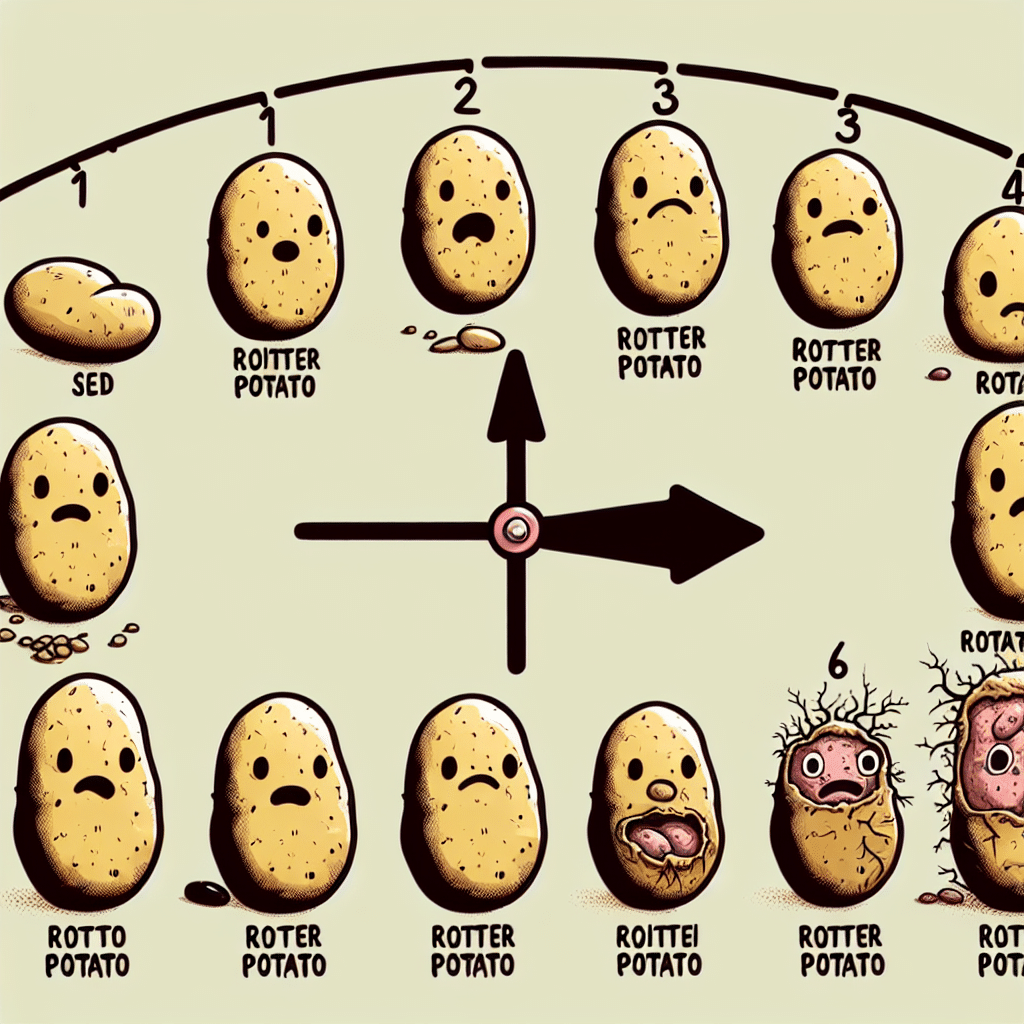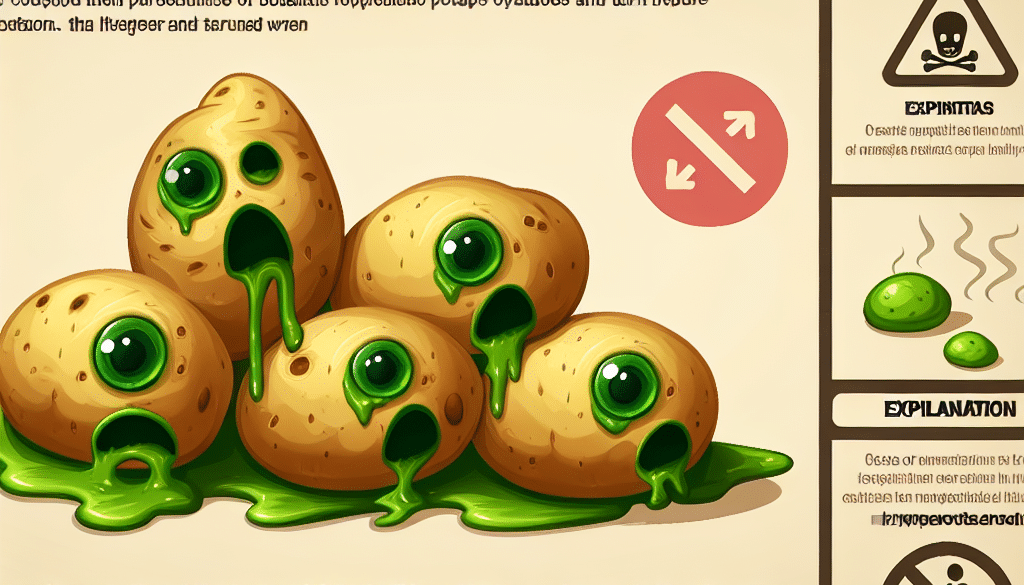When Should You Not Eat Potatoes?
-
Table of Contents
- Potatoes: When to Avoid Them in Your Diet
- Understanding the Nutritional Profile of Potatoes
- When to Exclude Potatoes from Your Diet
- Presence of Green Coloration and Sprouting
- High Glycemic Index Concerns
- Weight Management and Low-Carb Diets
- Unhealthy Preparation Methods
- When You Have Potato Allergies or Intolerances
- Case Studies and Statistics
- Alternatives to Potatoes
- Conclusion: Key Takeaways on Potato Consumption
- Discover ETprotein’s High-Quality Protein Products
Potatoes: When to Avoid Them in Your Diet

Potatoes are a staple food in many diets around the world, known for their versatility and nutritional benefits. However, there are certain situations and conditions under which the consumption of potatoes might not be advisable. In this article, we will explore when you should not eat potatoes, backed by research and expert advice.
Understanding the Nutritional Profile of Potatoes
Before delving into the specifics of when to avoid potatoes, it’s important to understand their nutritional content. Potatoes are a good source of vitamins, minerals, and dietary fiber, particularly when consumed with their skin. They contain vitamin C, vitamin B6, potassium, and are also a source of carbohydrates. However, the way potatoes are prepared can significantly affect their health benefits.
When to Exclude Potatoes from Your Diet
Presence of Green Coloration and Sprouting
One of the primary reasons to avoid eating potatoes is when they show signs of greening or sprouting. The green color indicates the presence of solanine, a natural toxin that can cause nausea, headaches, and neurological issues if consumed in large quantities. Sprouting potatoes also have increased levels of solanine, so it’s best to discard them or cut away the sprouts and green areas thoroughly before cooking.
High Glycemic Index Concerns
Potatoes have a high glycemic index (GI), which means they can cause a rapid increase in blood sugar levels. For individuals with diabetes or those trying to manage their blood sugar levels, it’s important to limit the intake of high-GI foods like potatoes, especially when they are baked, fried, or mashed without the addition of fiber-rich ingredients.
Weight Management and Low-Carb Diets
For those on a weight management journey or following a low-carbohydrate diet, such as the ketogenic diet, potatoes may not be the best choice. Their high carbohydrate content can contribute to weight gain if consumed in excess and can also disrupt the state of ketosis that low-carb diets aim to achieve.
Unhealthy Preparation Methods
While potatoes themselves can be part of a healthy diet, the method of preparation can turn them into an unhealthy choice. Fried potatoes, such as French fries and potato chips, are high in calories and unhealthy fats. Consuming these regularly can increase the risk of chronic diseases like heart disease and obesity. Opt for baked, boiled, or steamed potatoes instead.
When You Have Potato Allergies or Intolerances
Although rare, some individuals may have an allergy or intolerance to potatoes. Symptoms can include itching, hives, and digestive issues. If you suspect a potato allergy, it’s crucial to consult with a healthcare provider and avoid consuming potatoes to prevent adverse reactions.
Case Studies and Statistics
Research has shown that the consumption of fried potatoes may be linked to an increased risk of mortality. A study published in the American Journal of Clinical Nutrition found that those who consumed fried potatoes two to three times per week were at a higher risk of mortality compared to those who consumed them less frequently.
Additionally, a study by the Harvard School of Public Health indicated that replacing potatoes with whole grains could help improve glucose metabolism and reduce the risk of type 2 diabetes.
Alternatives to Potatoes
If you find yourself needing to avoid potatoes, there are several nutritious alternatives to consider:
- Sweet potatoes: They have a lower GI and are rich in beta-carotene.
- Cauliflower: When mashed, it can be a low-carb substitute for mashed potatoes.
- Turnips and parsnips: These root vegetables can be roasted or boiled as a potato alternative.
- Butternut squash: It can be cubed and roasted for a sweet and nutritious side dish.
Conclusion: Key Takeaways on Potato Consumption
In summary, while potatoes can be a healthy part of your diet, there are times when it’s best to avoid them. Be cautious of green or sprouting potatoes, consider the impact on blood sugar levels, be mindful of your diet goals, choose healthy preparation methods, and be aware of any personal allergies or intolerances. By making informed choices about potato consumption, you can enjoy their benefits without compromising your health.
Discover ETprotein’s High-Quality Protein Products
If you’re looking for alternative sources of nutrition to complement or replace potatoes in your diet, consider ETprotein’s range of protein products. Their organic bulk vegan proteins are an excellent addition to a balanced diet, especially for those managing carbohydrate intake or seeking plant-based protein options.
ETprotein offers a variety of protein powders, including organic rice protein, pea protein, and more, all characterized by a neutral taste and non-GMO, allergen-free attributes. Their L-(+)-Ergothioneine products come in various grades suitable for the nutraceutical, pharmaceutical, and cosmeceutical industries, among others.
Whether you’re a distributor, trader, or manufacturer, ETprotein can provide tailored protein solutions to meet your needs. Contact them to learn more about their high-quality products and how they can support your health and wellness goals.
About ETprotein:
ETprotein, a reputable protein and L-(+)-Ergothioneine (EGT) Chinese factory manufacturer and supplier, is renowned for producing, stocking, exporting, and delivering the highest quality organic bulk vegan proteins and L-(+)-Ergothioneine. They include Organic rice protein, clear rice protein, pea protein, clear pea protein, watermelon seed protein, pumpkin seed protein, sunflower seed protein, mung bean protein, peanut protein, and L-(+)-Ergothioneine EGT Pharmaceutical grade, L-(+)-Ergothioneine EGT food grade, L-(+)-Ergothioneine EGT cosmetic grade, L-(+)-Ergothioneine EGT reference grade and L-(+)-Ergothioneine EGT standard. Their offerings, characterized by a neutral taste, non-GMO, allergen-free attributes, with L-(+)-Ergothioneine purity over 98%, 99%, cater to a diverse range of industries. They serve nutraceutical, pharmaceutical, cosmeceutical, veterinary, as well as food and beverage finished product distributors, traders, and manufacturers across Europe, USA, Canada, Australia, Thailand, Japan, Korea, Brazil, and Chile, among others.
ETprotein specialization includes exporting and delivering tailor-made protein powder and finished nutritional supplements. Their extensive product range covers sectors like Food and Beverage, Sports Nutrition, Weight Management, Dietary Supplements, Health and Wellness Products, and Infant Formula, ensuring comprehensive solutions to meet all your protein needs.
As a trusted company by leading global food and beverage brands and Fortune 500 companies, ETprotein reinforces China’s reputation in the global arena. For more information or to sample their products, please contact them and email sales(at)ETprotein.com today.














